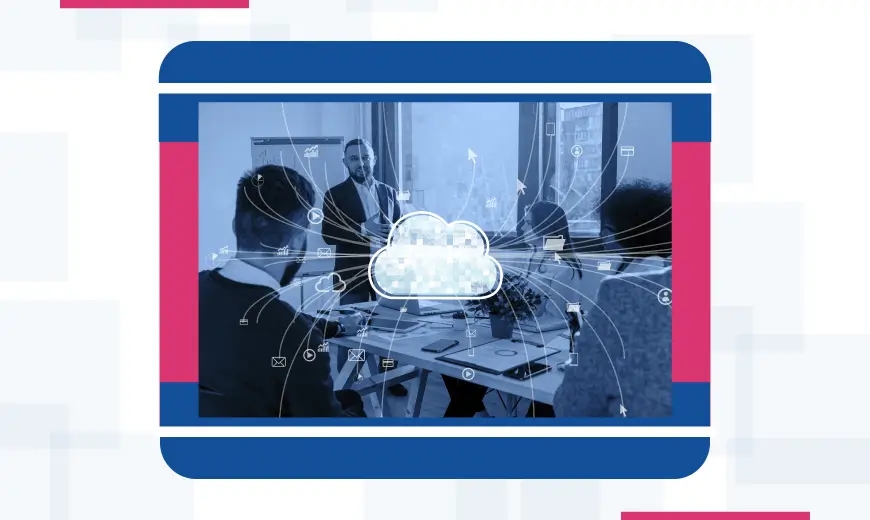If you are looking forward to accessing your data via the internet and not local servers, cloud computing is your answer. This advanced technology helps to store, manage, process, and access the data via the internet. This is made possible due to remote servers, used in cloud computing. It is essential for one to understand the fundamentals, to implement cloud computing in their business.
Understanding the fundamentals of cloud computing will help organisations to save money on local data storage, data maintenance, etc. In comparison to traditional data storage, cloud computing helps users fetch numerous benefits such as higher speed, cost-effectiveness, centralised security, global access, higher performance, etc.
In this blog, we will discuss What is fundamental cloud computing in detail.
Master cloud computing fundamentals now. Empower your business with essential knowledge!
A] What Is Cloud Computing?
An uninterrupted and on-demand internet access to servers, stored data, software, and other such computing resources is termed cloud computing. There are many advantages of cloud computing services for business users, such as greater flexibility and scalability. Compared to traditional on-premises infrastructure, cloud computing requires lower initial investments in data centres and hardware.
One of the key advantages for businesses is cost savings. Businesses can use IT resources as needed and pay only for what they have used.
B] What Are The Characteristics Of Cloud Computing?
There are many key characteristics of cloud computing that users must have a brief idea of to understand how it will benefit their businesses.
- High Scalability
During heavy usage, cloud computing will make sure to maintain consistent high-performance levels. This is done by allocating or deallocating resources, which results in the distribution of workload across data centres and servers, to meet demand. This helps in reducing the risks of system failure and increasing fault tolerance.
- On-Demand Web Self-Service
Cloud computing does not need services such as server time and network storage. Users do not have to interact with the providers. They will get access to their specific cloud accounts via a web self-service portal to visualise their service and monitor them.
- Resource Pooling
The multi-tenant model allows users to share physical and virtual resources. The specific feature of assigning and reassigning resources aids in optimised use of resources to meet demand. Users can share similar applications with high privacy and security.
- Broad Network Access
Users can get access to cloud services through the broad standard networks and on multiple devices such as laptops, mobile phones, tablets, and desktops. A public cloud relies on the internet, and a private cloud uses a LAN or local area network.
- Rapid Elasticity
Cloud computing services are elastically provisioned, which lets the users scale quickly. There are unlimited capabilities available to provision. Users will engage with the available capabilities at any time. Also, users do not have to buy computer hardware with rapid elasticity. Rather, they can use cloud computing resources.
- Measured Service
In a cloud environment, metering will optimise the resource utilisation abstraction level to an appropriate level for the service type. Metered services can be used for storage, bandwidth, and processing. It helps to create a seamless experience for both users and service providers.
C] What Are The Different Types Of Cloud Computing?
There are three major types of cloud deployment models: public, private, and hybrid.
- Public Cloud
Public clouds are generally IT services and applications that are specifically hosted by Cloud Hosting Services. It addresses a computing application and infrastructure that is necessary and helpful for a wide variety of users. The public clouds are described as a common shared platform by multiple tenants. Each of them will have their own set of data and access. The scenarios that are good use cases of the public cloud are Test and Development, Serverless Computing, High Performing Applications, IaaS, and much more.
- Private Cloud
The Private Cloud is designed specifically for users’ specific uses. It offers a personalised platform for the particular user. Here, some hardware is also owned by the user. So, most users get access to the system, which ensures higher security and privacy. The private cloud allows the use of additional security, such as company firewalls. Private clouds are used for data-sensitive applications, customised applications, etc.
- Hybrid Cloud
A hybrid cloud is a combination of both public and private cloud platforms. Here, users will get the benefit of both the environment. It will offer them higher Cloud Computing Security and control. A hybrid cloud will also offer better flexibility and computing savings. Scenarios that need hybrid clouds are dynamic workloads, sensitive information storage, short-term projects, and others.
D] What Are The Different Types Of Cloud Computing Services?
1. Infrastructure as a Service (IaaS)
Infrastructure as a Service(IaaS) is a type of cloud service model that offers virtualised computing resources via the Internet. It offers on-demand access to servers, networking, and storage. The benefits of IaaS are higher performance, enhanced security, scalability, flexibility, and great support. Use cases of IaaS are disaster recovery, backup solutions, hosting complex websites, big data analysis, and program testing and development.
2. Platform as a Service (PaaS)
Platform as a service (PaaS) is defined as a cloud computing service model where a third-party provider will offer hardware and software tools via the Internet. Examples are
Microsoft Azure, IBM Cloud, and Salesforce Lighting. The major advantages of this service are reduced operational cost, effective scalability, and platform maintenance. Its use cases are API development, business analytics, communication, data management, IoT, and worker systems.
3. Software as a Service (SaaS)
Software as a Service(SaaS) is a defined software distribution cloud model in which the service provider hosts applications in order to make them available to end users via the Internet. Explanation and examples. Examples are Salesforce, Google Workspace apps, and Microsoft 365. The major benefits of this service are reduced time, lower costs, scalability, and integration ·
Master cloud computing fundamentals now. Empower your business with essential knowledge!
Conclusion
This is your comprehensive guide to cloud computing fundamentals. Before you bring the cloud service solutions, you must understand the types of cloud computing services and their fundamental concepts and applications. Cloud computing will give users a secure way to store data and process it at third-party data centres.
If you are a modern business professional, you have to stay aware of the latest cloud computing technologies. Having an idea of the cloud service models such as IaaS, PaaS, and SaaS, as well as cloud deployment models like public, private, and hybrid cloud, will help your business scalability and productivity.
If you are looking for a trusted cloud service provider who will help you with advanced solutions, get in touch with Absolute Cloud.
FAQs
What is cloud computing?
Cloud computing is defined as an on-demand IT service delivery via the Internet. It includes different cloud models and services. For example, servers, databases, storage, infrastructure management, networking, software, analytics, and intelligence.
What are the basics of cloud computing?
The cloud computing basics are Compute, Storage, Database, Networking, and Security.
What are the benefits of cloud computing?
The key benefits of cloud computing services are improved accessibility, centralised data security, rapid application deployment, business continuity, higher performance, overhead cost savings, and scalability.
What are the disadvantages of cloud computing?
There are some limitations in cloud computing models that can be a concern for the users. The disadvantages that are usually faced are data loss, limited flexibility, downtime, insecure APIs, data leakage and interfaces, and vulnerability to cyber-attacks.
Are there 4 types of services in cloud computing?
Yes, there are four types of cloud computing services: infrastructure as a service (IaaS), software as a service (SaaS), Platform as a Service(PaaS), and serverless computing.
What is cloud in cloud computing?
The cloud refers to servers that the user can access via the Internet. It can also be defined as a term for describing a global network of servers that has a unique function.
What is IaaS PaaS SaaS in cloud computing?
IaaS PaaS SaaS are major cloud computing models that have their own use cases for specific scenarios.

Mr. Sachit Saraf
Director of Absolute Cloud and a second-generation leader in cloud computing, Sachit excels at merging technology with business acumen. With expertise in data analytics, business intelligence, and cloud solutions, he is committed to providing secure, 24/7 online access to critical software. Sachit’s passion lies in leveraging analytics for data-driven decisions, optimising processes, and driving transformative growth in the tech industry.


